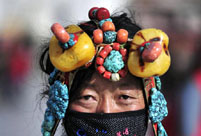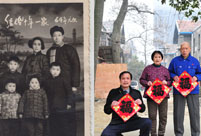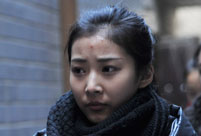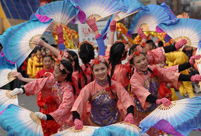 Turnip sculptures amaze tourists in Qingdao
Turnip sculptures amaze tourists in Qingdao Chinese ship formation conducts live fire training in West Pacific
Chinese ship formation conducts live fire training in West Pacific
 China comes in third at figure skating team event
China comes in third at figure skating team event
 China's teenager skater Yan shines at his Olympic debut
China's teenager skater Yan shines at his Olympic debut
 Taiwan-born actor stars on US TV series
Taiwan-born actor stars on US TV series
 Chinese Lunar New Year gift from abroad
Chinese Lunar New Year gift from abroad Chinese champions of Winter Olympic Games
Chinese champions of Winter Olympic Games  Zhang Yimou fined 7.48 mln for over-production
Zhang Yimou fined 7.48 mln for over-production
 Top 10 timeless female Chinese stars
Top 10 timeless female Chinese stars
LANZHOU, Feb. 18 -- A Buddhist archaeological site, complete with ashes of prominent devotees, has been identified in northwest China, Gansu archaeology institute confirmed on Tuesday.
The Buddhist relics were found in Jingchuan County, an important way station on the east section of the Silk Road.
The discoveries come from a round of excavations which began in Dec. 2012 at the site of Longxing Temple, which dates back to the Song Dynasty (960-1279).
Archaeologists found a pottery coffin containing bone fragments, glass bottles and 1,700 samples of ashes no bigger than grains of rice, said excavation team leader Wu Hong.
"This is the third time these kinds of Buddhist remains have been unearthed in the Jingchuan region, following previous digs in 1964 and 1969," said Wu.
Wu's team also found an inscribed brick as well as bones and teeth concealed in the Manjusri Hall at Longxing.
The team also found various pieces of broken statuary. Over 260 pieces of stone, pottery and dried mud from various dynasties have been collected.
Buddhism prospered in Jingchuan throughout different dynasties and a number of major temples are still well preserved.
 Top 10 Chinese youth’s favorite seaside destinations
Top 10 Chinese youth’s favorite seaside destinations Traditional Tibetan clothing tailors
Traditional Tibetan clothing tailors In photos: Unveiling Taishan station
In photos: Unveiling Taishan station Beautiful moments of family reunion
Beautiful moments of family reunion It's not just performing this year
It's not just performing this year 10 Valentine's Day ideas for couples
10 Valentine's Day ideas for couples Let's get married today!
Let's get married today! Highlights of opening ceremony of Sochi 2014 Winter Olympics
Highlights of opening ceremony of Sochi 2014 Winter Olympics Highlights of Chinese New Year celebrations around the world
Highlights of Chinese New Year celebrations around the world  Ruins of Shang Dynasty's structure unearthed in Shaanxi
Ruins of Shang Dynasty's structure unearthed in Shaanxi  Intercity high speed train in operation for the first
Intercity high speed train in operation for the first  Severe coldness freezes large parts of China
Severe coldness freezes large parts of China  Beautiful moments of Sochi
Beautiful moments of Sochi  It's not just performing this year
It's not just performing this year Selfies of "Little colorful flag" girl unveiled
Selfies of "Little colorful flag" girl unveiled Day|Week|Month